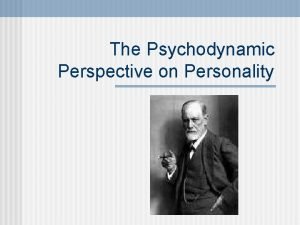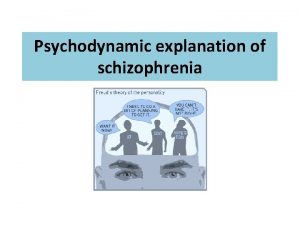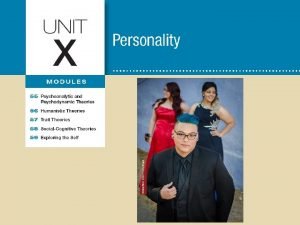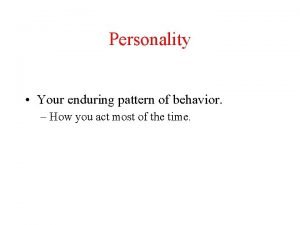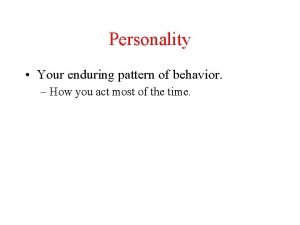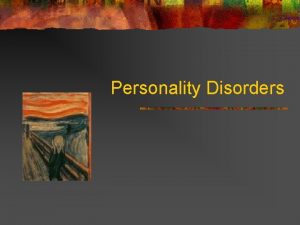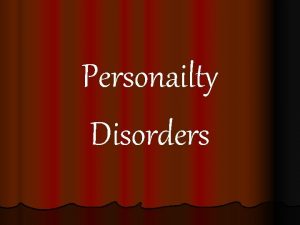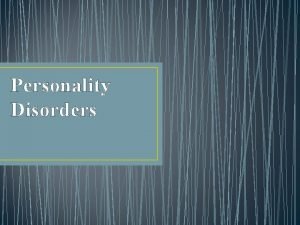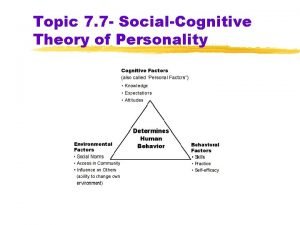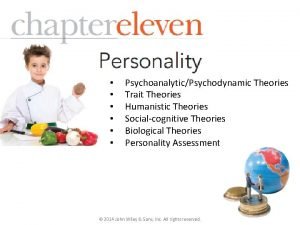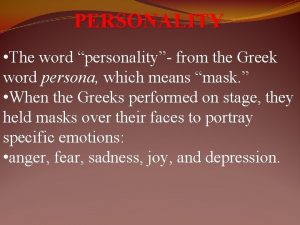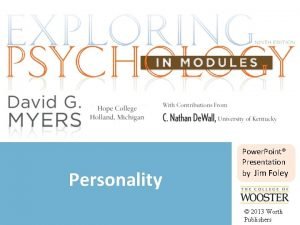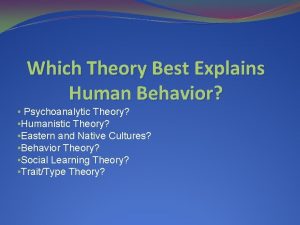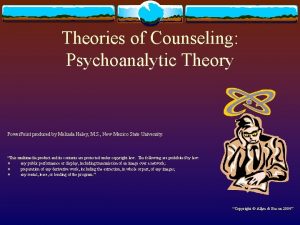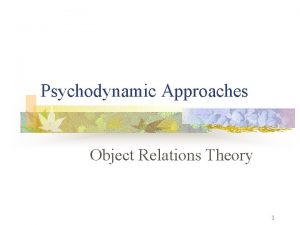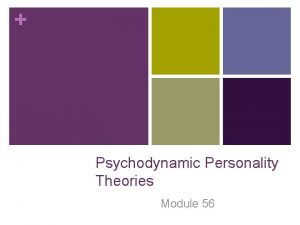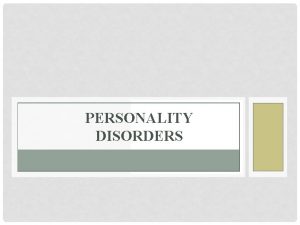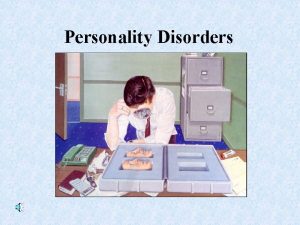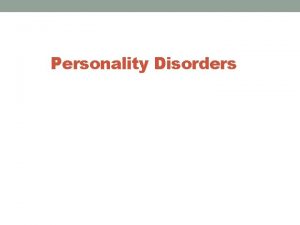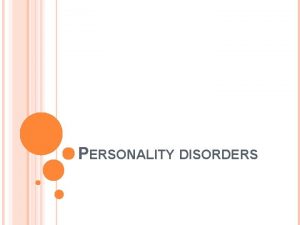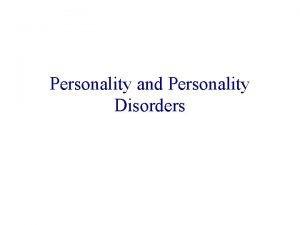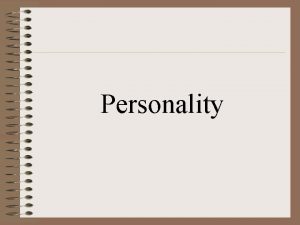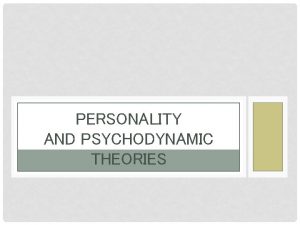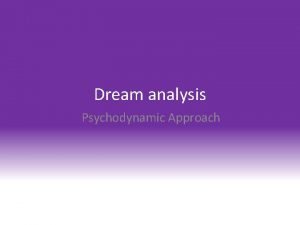Psychodynamic Approaches Personality The pattern of enduring characteristics


















- Slides: 18

Psychodynamic Approaches

• *Personality*: The pattern of enduring characteristics that produce consistency and individuality in a given person. • Encompasses the behaviors that make each of us unique and that differentiate us from others. • Leads us to act consistently in different situations and over extended periods of time.

*Psychodynamic Approaches to Personality* Approaches that assume that personality is motivated by inner forces and conflicts about which people have little awareness and over which they have no control. Who: Sigmund Freud: most important pioneer Carl Jung, Karen Horney, Alfred Adler: refined Freud’s theory and developed their own psychodynamic approaches

Freud’s Theory *Psychoanalytic Theory* Freud’s theory that unconscious forces act as determinants of personality. *Unconscious* A part of the personality that contains the memories, knowledge, beliefs, feelings, urges, drives, and instincts of which the individual is not aware. • Conscious experience is only a small part of our psychological makeup & experience. • Much of our behavior is motivated by the unconscious

The Unconscious • Contents of the unconscious far surpass in quantity the information in our conscious awareness. • Must expose the unconscious to understand personality. Unconscious cannot be observed directly. Why? Clues to the unconscious: slips of the tongue, fantasies, dreams May be interpreted as Need to interpret to understand the unconscious revealing unconscious sexual desires. processes that direct behavior.

The Unconscious • Preconscious • makes up some of the unconscious • contains non-threatening material • easily brought to mind Ex: 2+2=4 Deeper in unconscious: instinctual drives, wishes, desires, demands, needs that are hidden because of conflicts/pain they would cause if part of everyday life Unconscious provides “safe haven” for recollections of threatening events.

Self Disclosure Exercise

Id, Ego, Superego • 3 separate, but interacting components of personality. • Represent abstract conceptions of a general model of personality that describes the interaction of forces that motivate behavior.

• *Id* The raw, unorganized, inborn part of personality whose sole purpose is to reduce tension created by primitive drives related to hunger, sex, aggression, and irrational impulses. Operates according to the pleasure principle (the goal is the immediate reduction of tension and maximization of satisfaction) Reality prevents fulfillment

*Ego* The part of the personality that provides a buffer between the id and the outside world. Operates according to the reality principle (instinctual energy is restrained to maintain “Executive” of personality. What does this mean? safety of individual and integrate person into society

*Superego* The final personality structure to develop; it represents the rights and wrongs of society as handed down by a person’s parents, teacher, and other important figures. Includes conscience -prevents us from behaving in a morally improper way -makes us feel guilty if we do wrong Superego makes our behavior less selfish by controlling impulses from the id.

Superego Perfectionists unable to make compromises that life requires. Id Primitive, pleasureseeking, thoughtless individual seeking to fulfill every desire without delay. Ego must mediate between the demands of superego & id.

Psychosexual Stages *Psychosexual Stages* Developmental periods that children pass through during which they encounter conflicts between the demands of society and their own sexual images. Failure to resolve conflicts at particular stage can result in fixations. *Fixations* Conflicts or concerns that persist beyond the developmental period in which they first occur. needs ignored or overindulged

• Sequence explains how experiences/difficulties during a stage may predict specific characteristics in adult personality.

Oral Stage • *Oral stage* Stage from birth to 12 -18 months in which an infant’s center of pleasure is the mouth. • Mouth is focal point of pleasure. • Children suck, eat, mouth, and bite anything they can put in their mouths. • Weaning represents main conflict. Results of Fixation Adult unusually interested in oral activities: eating, talking, smoking Adult shows symbolic sorts of oral interests: “bitingly” sarcastic or very gullible

Anal Stage • *Anal Stage* Stage from 12 -18 months to 3 yrs, in which child’s pleasure is centered on the anus. • Period when emphasis is on toilet training. • Children obtain pleasure from retention and expulsion of feces. Results of Fixation Adult is unusually rigid, orderly, punctual, or extremely sloppy.

Phallic Stage *Phallic Stage* Period beginning around age 3 during which a child’s pleasure focuses on the genitals. During this stage, child must negotiate the Oedipal conflict. *Identification* Process of wanting to be like another person as much as possible, imitating that person’s behavior and adopting similar beliefs and values. Son identifies wit his father; seeks to obtain a women like his unattainable mother. Difficulties during this stage --> failure to develop a conscience

Latency Period & Genital Stage • *Latency Period* Period between the phallic stage and puberty during which a child’s sexual concerns are temporarily put aside. • *Genital Stage* Period from puberty until death, marked by mature sexual behavior.
 Psychodynamic perspective of personality
Psychodynamic perspective of personality Psychodynamic personality theory
Psychodynamic personality theory Psychodynamic personality theory
Psychodynamic personality theory Psychodynamic approach to personality
Psychodynamic approach to personality Hans and sybil eysenck
Hans and sybil eysenck Enduring pattern of behavior
Enduring pattern of behavior Enduring pattern of behavior
Enduring pattern of behavior Enduring pattern of behavior
Enduring pattern of behavior Splitting borderline personality disorder examples
Splitting borderline personality disorder examples Hypersensitivity personality
Hypersensitivity personality Enduring pattern meaning
Enduring pattern meaning Cognitive perspective of personality
Cognitive perspective of personality Humanistic theories emphasize
Humanistic theories emphasize Greek word for personality
Greek word for personality Social cognitive approaches to personality
Social cognitive approaches to personality Type of theories
Type of theories Hát kết hợp bộ gõ cơ thể
Hát kết hợp bộ gõ cơ thể Difference between psychoanalysis and psychodynamic
Difference between psychoanalysis and psychodynamic Sigmund freud psychodynamic theory
Sigmund freud psychodynamic theory
